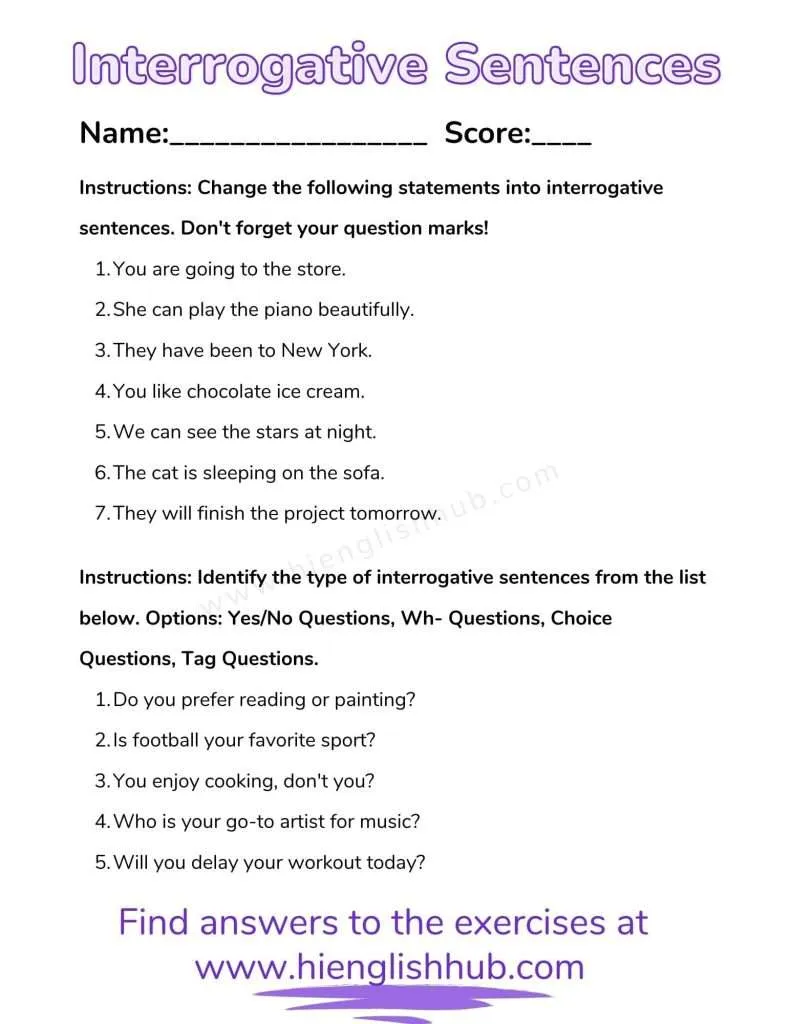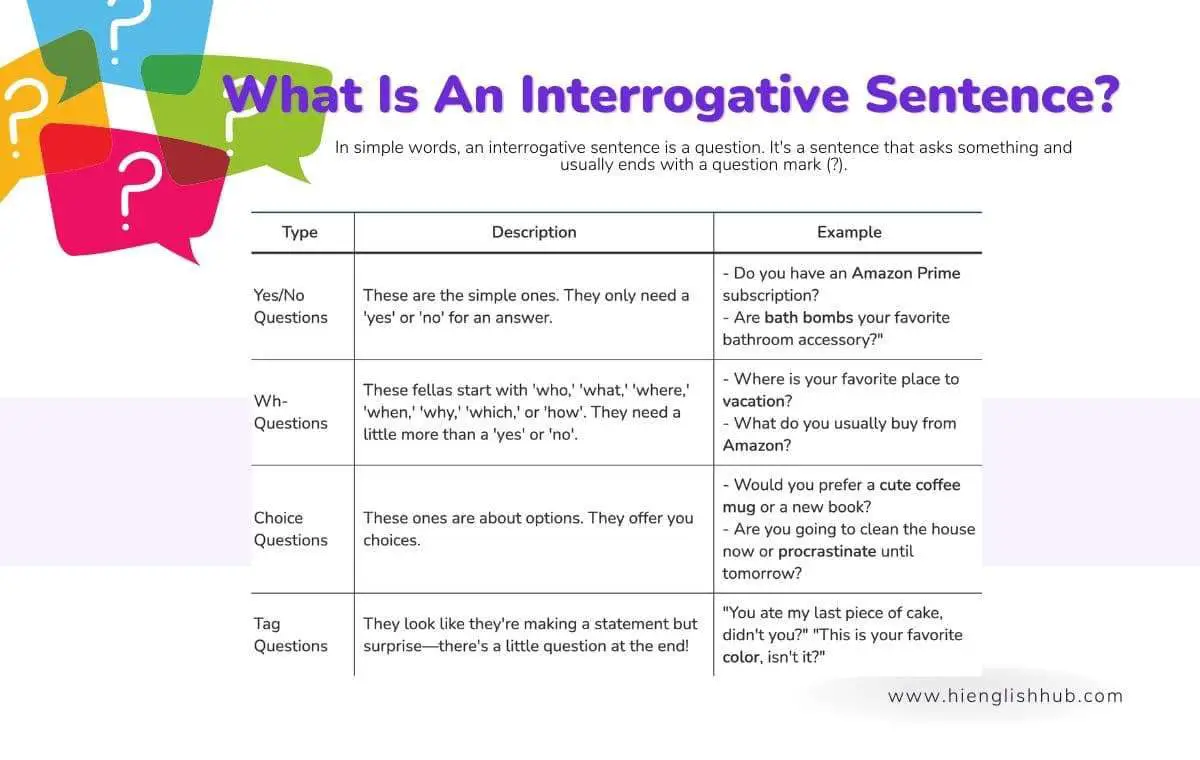We’re about to dive into the fascinating world of interrogative sentences. Yep, we’re talking about all those questions that make conversations and written interactions so much more exciting.
They’re a key part of our language, and by the end of this post, you’ll be an expert!
What Is An Interrogative Sentence?
In simple words, an interrogative sentence is a question. It’s a sentence that asks something and usually ends with a question mark (?).
Also read:
Types Of Interrogative Sentences
Ready to dive into the world of questions? Check out the table below, where we break down the four main types of interrogative sentences.
| Type | Description | Example | Use |
|---|---|---|---|
| Yes/No Questions | These are the simple ones. They only need a ‘yes’ or ‘no’ for an answer. | – Do you have an Amazon Prime subscription? – Are bath bombs your favorite bathroom accessory?” | Seeking confirmation or information |
| Wh- Questions | These fellas start with ‘who,’ ‘what,’ ‘where,’ ‘when,’ ‘why,’ ‘which,’ or ‘how.’ They need a little more than a ‘yes’ or ‘no.’ | – Where is your favorite place to vacation? – What do you usually buy from Amazon? | Gathering specific details or seeking explanations |
| Choice Questions | These ones are about options. They offer you choices. | – Would you prefer a cute coffee mug or a new book? – Are you going to clean the house now or procrastinate until tomorrow? | Presenting alternatives and seeking a preference |
| Tag Questions | They look like they’re making a statement but surprise—there’s a little question at the end! | “You ate my last piece of cake, didn’t you?” “This is your favorite color, isn’t it?” | Seeking confirmation, seeking agreement, or engaging the listener |
How to Form Interrogative Sentences
Check out the handy formulas below to craft four different types of interrogative sentences—Yes/No Questions, Wh- Questions, Choice Questions, and Tag Questions. Just fill in the blanks, and you’re good to go!
| Type of Question | Formula | Example |
|---|---|---|
| Yes/No Questions | Helping Verb + Subject + Main Verb + “?” | Do + you + play + guitar? |
| Wh- Questions | Wh- word + Helping Verb + Subject + Main Verb + “?” | Where + do + you + live? |
| Choice Questions | Helping Verb + Subject + Main Verb + Choice1 + “or” + Choice2 + “?” | Would + you + prefer + tea + or + coffee? |
| Tag Questions | Positive Statement + “,” + Negative Helping Verb + Subject + “?” or Negative Statement + “,” + Positive Helping Verb + Subject + “?” | You’re coming to the party, + aren’t + you? You’re not coming to the party, are you? |
How To Change An Interrogative Sentence Into Indirect Speech
Sometimes we need to report questions someone else asked. This is called indirect speech.
For example, if Tim asked, “What time is it?”
You’d tell someone else, “Tim asked what time it was.” The question becomes a statement. Sneaky, huh?
Common Mistakes With Questions
| Common Mistakes With Questions | Explanation | Correct Usage |
|---|---|---|
| Incorrect Word Order | In questions, the verb often comes before the subject. | “Where are you going?” instead of “You are going where?” |
| Missing Auxiliary Verbs | Auxiliary verbs (like do, does, is, are, etc.) are essential in forming questions. | “Do you like apples?” instead of “You like apples?” |
| Forgetting the Question Mark | Every question should end with a question mark (?). | “Are you okay?” not “Are you okay.” |
| Misusing ‘Wh’ Words | Each ‘Wh’ question word has a specific usage. | Use ‘where’ for places, ‘when’ for times, ‘who’ for people, etc. |
| Incorrect Tag Questions | The auxiliary verb in the tag must be the opposite of the verb in the main sentence. | “She’s coming, isn’t she?” instead of “She’s coming, is she?” |
Interrogative Sentence Worksheet

Instructions: Change the following statements into interrogative sentences. Don’t forget your question marks!
- You are going to the store.
- She can play the piano beautifully.
- They have been to New York.
- You like chocolate ice cream.
- We can see the stars at night.
- The cat is sleeping on the sofa.
- They will finish the project tomorrow.
Answers:
- Are you going to the store?
- Can she play the piano beautifully?
- Have they been to New York?
- Do you like chocolate ice cream?
- Can we see the stars at night?
- Is the cat sleeping on the sofa?
- Will they finish the project tomorrow?
Instructions: Identify the type of interrogative sentences from the list below. Options: Yes/No Questions, Wh- Questions, Choice Questions, Tag Questions.
- Do you prefer reading or painting?
- Is football your favorite sport?
- You enjoy cooking, don’t you?
- Who is your go-to artist for music?
- Will you delay your workout today?
Answers:
- Do you prefer reading or painting? – Choice Questions
- Is football your favorite sport? – Yes/No Questions
- You enjoy cooking, don’t you? – Tag Questions
- Who is your go-to artist for music? – Wh- Questions
- Will you delay your workout today? – Yes/No Questions
FAQs On Interrogative Sentences
Now let’s answer some common questions about… questions!
What Are The Different Types Of Interrogative Sentences?
There are four types of questions: Yes/No questions, Choice questions, Wh- questions, and Tag questions.
What Are The Uses Of Interrogative Sentences?
Interrogative sentences, or questions, are used for:
1. Collecting Information: Like “What’s your name?”.
2. Confirming Details: Such as “Is the IELTS test tomorrow?”.
3. Seeking Help or Directions: For example, “Can you help me with this?”.
4. Making Choices: For example, “Should I wear the red or blue shirt?”.
5. Expressing Surprise: Like “Did he really win the race?”.
6. Starting Conversations: “How was your day?” is a common start to a chat.
Give 10 Examples Of Interrogative Sentences.
The following sentences showcase the versatility of interrogative sentences in different contexts and communication scenarios.
1. Are you coming to the party tonight?
2. What time is the meeting?
3. Did you finish your homework?
4. How was your weekend?
5. Can I borrow your book?
6. Have you ever been to Paris?
7. Why did you choose that movie?
8. Where did you put my keys?
9. Would you like some coffee?
10. Who is the new employee on our team?
Final Thoughts
And that’s a wrap, my grammar-loving friends! You’ve journeyed through the ins and outs of interrogative sentences, mastering everything from their basic formation to the art of posing different types of questions.
Now you’re all set to fire off precise and effective questions in your writing and conversations.
But remember, learning is all about application. So, start peppering your chats with these newly learned question structures. Give yourself a little challenge—see how many different types of questions you can use in a day!
If this post has added a dash of grammar wisdom to your day, why not share the love? Pass it on to friends, family, or anyone else keen to polish their language skills.
Don’t forget to follow Hi English Hub on Pinterest and Twitter for more helpful tips and language insights.

